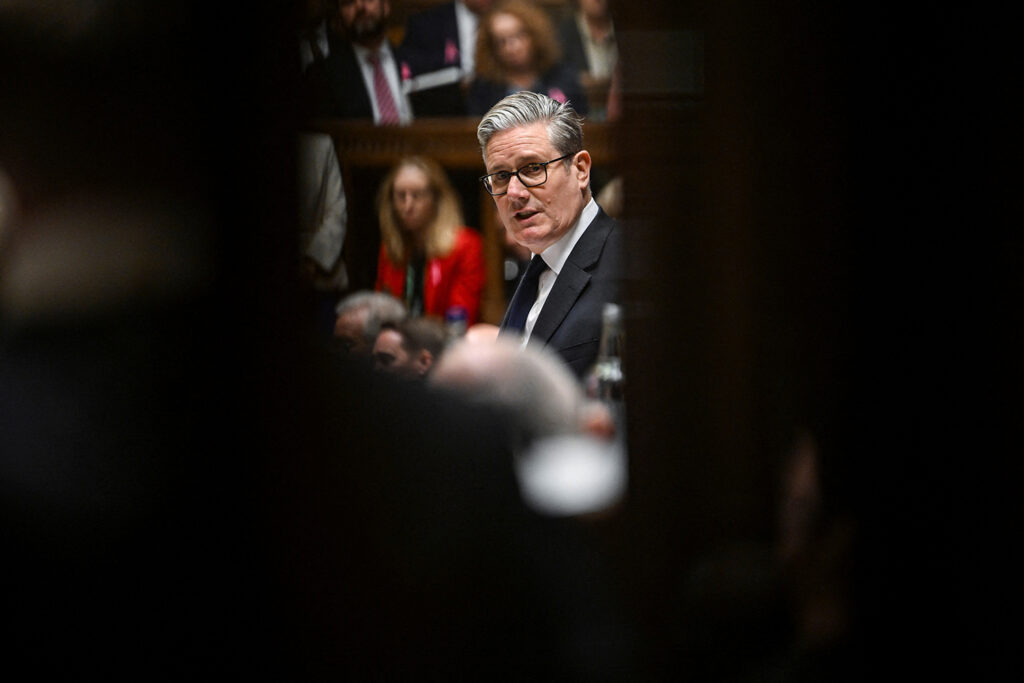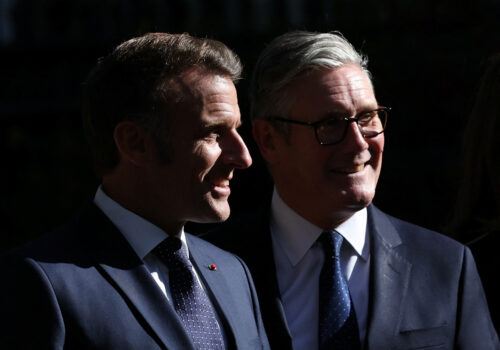Barely five hundred days have passed since the Labour Party’s landslide victory in the 2024 UK elections. Yet Keir Starmer’s government is already in deep trouble, stricken by record-low public approval ratings driven by a stumbling economy, creaking public services, and a continuing crisis over immigration.
The situation is unlikely to get any better soon. This week, Chancellor of the Exchequer Rachel Reeves is set to announce a package of measures to raise more in taxes to fill a £20 billion hole in public finances.
International bond markets are watching anxiously, and some critics have argued that the UK economy risks entering a doom loop of high taxes, low growth, and rising debt. Inflation remains stubbornly above the government’s target, unemployment is up, and debt interest payments this year are forecast to represent more than 8 percent of all public spending.
It is a gloomy economic picture that has been gleefully exploited by political opponents, particularly the populist right-wing Reform UK party led by Nigel Farage. Reform UK is consistently ten points or more ahead of the Labour Party in national opinion polls.
Mixing nostalgic nationalism and anti-immigration sentiment, as well as interventionist economic policy proposals more traditionally deployed by the political left, Farage has drawn public support across normal political boundaries and tapped into a deep-seated disillusionment with mainstream political parties and politicians.
Reform UK looks to be on course to perform well in midterm elections due next May in the Scottish Parliament, the Senedd in Wales, and a host of local councils in England. Many in Labour fear their party is facing an electoral wipeout in what will, inevitably, be seen as a referendum on the performance of the Starmer government.
How the situation came to this
In Labour’s defense, the new government inherited an economy that had been seriously underperforming for more than a decade and a half. Britain’s gross domestic product grew at roughly half the rate of the United States between the financial crash of 2008 and 2024—and while the US gross domestic product per capita increased by more than 70 percent over this period, there was an actual fall of 2 percent in the United Kingdom.
Public services in health, education, and criminal justice had been left in a dismal state too after years of financial austerity imposed by Labour’s Conservative predecessors, and the double whammy of Brexit and the COVID-19 crisis hit the United Kingdom hard.
Politically, the country has recently been in almost constant flux, with five Conservative prime ministers in just eight years between the 2016 Brexit referendum and the general election last year. Yet any hope that Starmer’s mammoth victory last year would herald a new phase of political stability and prosperity has evaporated rapidly.
In truth, he owed his landslide parliamentary success (under Britain’s first-past-the-post electoral system) less to a resounding popular mandate for Labour and more to the collapse of the Conservative Party vote and an increase in support for smaller parties. No majority government in the United Kingdom since the adoption of universal suffrage has won office on a lower share of the national ballot—less than 34 percent—than this one.
Yet, while the government’s political foundations were always fragile, the first seventeen months of Starmer’s government have been marked by a series of self-inflicted policy missteps (particularly on welfare reform) and high-profile resignations amid controversy, including his chief of staff, Sue Gray; his deputy prime minister, Angela Rayner; and even his high-profile ambassador to the US, Peter Mandelson.
What lies ahead for Starmer?
The position of the prime minister himself is now being seriously questioned, too. Labour members of parliament (MPs) are privately discussing possible replacements, and speculation is rife that Starmer might face a potential challenge before or soon after the elections in May next year.
Health Secretary Wes Streeting, from the party’s right, is a potential successor, as is Rayner, now outside government but popular among activists and MPs on the left. Another possibility is Shabana Mahmood, who, as home secretary, has just unveiled a package of hardline measures to deter the thousands of migrants entering the United Kingdom illegally across the English Channel in small boats.
One further intriguing candidate would be Andy Burnham, who was an MP until 2016 and has since carved out an effective political base as the directly elected mayor of Greater Manchester in the north of England. He would, however, need to find a way back to Parliament via a by-election if he is to join any future contest.
For now, the current prime minister soldiers on. A former human-rights lawyer who led the Crown Prosecution Service, he has sought to bring technocratic, managerial competence to government after years of political turmoil. Yet even his most ardent supporters accept that he lacks charisma and struggles to connect with many of the voters who are angry, disillusioned, and desperate for radical change.
Starmer can credibly claim significant successes during his time in 10 Downing Street, not least on the international stage. He has built a close relationship with US President Donald Trump and, with French President Emmanuel Macron, has led the European response to US attempts to appease Russian aggression in Ukraine.
By committing Britain to increasing its own defense spending, the prime minister was an important influence on other members of NATO that signed up to The Hague Summit Declaration, and he has helped secure a warmer relationship with the European Union after years of suspicion and mistrust. A new trade agreement, one that softens the impact of the hard Brexit deal agreed by former Prime Minister Boris Johnson in 2019, was solidified in May alongside other breakthrough trade deals this year, including with the United States and India.
Even on the domestic front, Starmer’s government has been busy, from developing a new industrial strategy aimed at driving future economic growth to shaping new investment in clean energy, and from nationalizing Britain’s railways to reforming antiquated planning and permitting rules. Labour’s parliamentary majority is secure for at least another three years.
Yet Starmer’s public favourability score continues to be significantly down, with one poll earlier this month suggesting he is the most unpopular prime minister in the United Kingdom for almost fifty years. His government appears unable to escape a series of crises and scandals, and he has acknowledged that delivering tangible and positive changes to people’s lives has proved far more difficult than expected.
Labour MPs worry that Starmer lacks a compelling vision and is no match against the charismatic Farage. Despite being elected on a platform of change, his government’s approach has been characterized more by caution and a search for stability. It is clear now that he and his party were woefully unprepared in policy terms for the demands posed by the United Kingdom’s current situation.
It is the persisting economic challenges and high cost of living that continue to be the heaviest drag on Starmer and his team, and there is a lot riding on Reeves’s finance statement this week. Unless there is an imminent change of fortune, the United Kingdom looks likely to be facing a new round of political musical chairs soon.
Ed Owen is a nonresident fellow of the Atlantic Council’s Europe Center and a former UK government adviser.
Further reading
Fri, Sep 19, 2025
Three things to note in the UK’s new Defence Industrial Strategy
New Atlanticist By Deborah Cheverton
“Defence is an Engine for Growth,” according to an important new British military strategy published on September 8.
Thu, Aug 28, 2025
Will European pressure bring Iran back to the table for nuclear talks?
Fast Thinking By
Germany, France, and the United Kingdom are threatening economic measures against Iran to pressure it into rejoining talks aimed at placing limits on its nuclear program.
Thu, Jul 17, 2025
Macron and Starmer have a plan to reset Anglo-French relations. What’s in this ‘Entente Industrielle’?
New Atlanticist By Philippe Dickinson
The French president’s three-day trip to the United Kingdom saw several notable and welcome announcements. But the real test will be what comes next.
Image: Britain's Prime Minister Keir Starmer speaks during the Prime Minister's Questions at the House of Commons in London, Britain, on October 15, 2025. Photo by House of Commons/Handout via Reuters.




